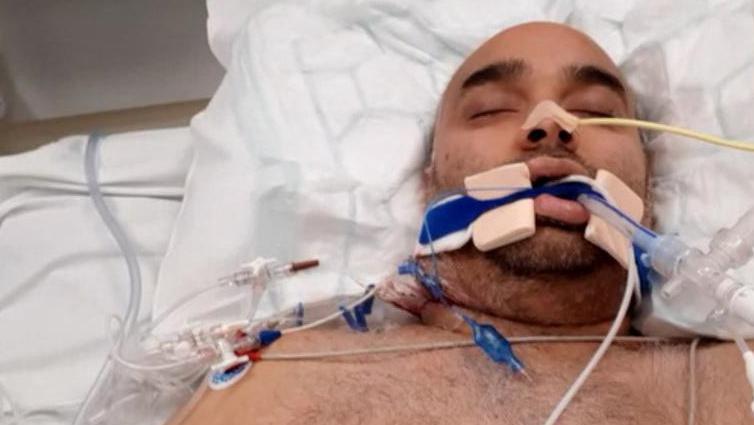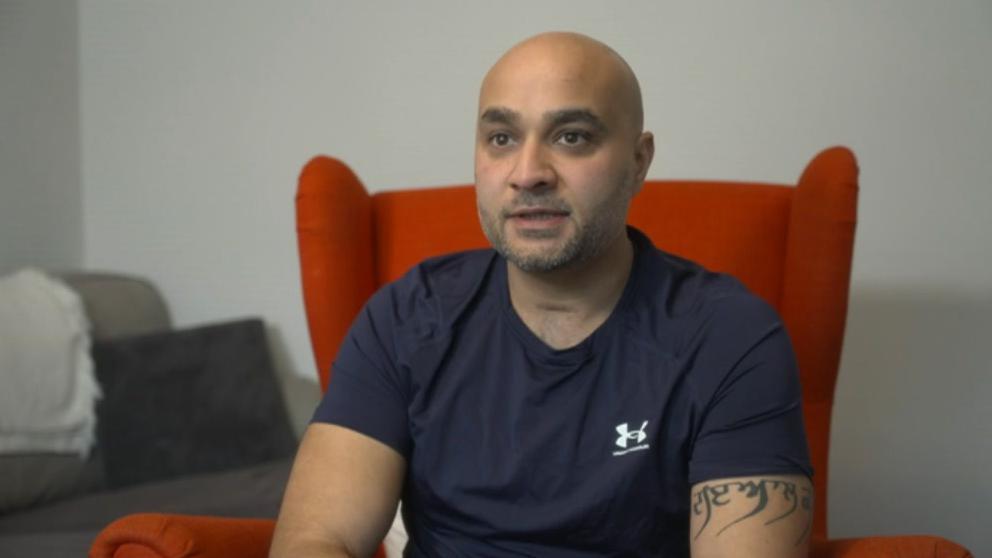Man clinically dead for 45 minutes embracing life
Man who was clinically dead meets doctor who saved his life
At a glance
Sarbjit Singh, 42, went into cardiac arrest after contracting Covid-19 in November 2020
Doctors in Birmingham trialled a pioneering technique using two defibrillators to resuscitate him
He is now taking on a running challenge after making a full recovery
- Published
A man who was clinically dead for 45 minutes is taking on an endurance running challenge after making a full recovery.
Sarbjit Singh, 42, was resuscitated by doctors in Birmingham using two defibrillators in a pioneering technique after he contracted coronavirus in 2020.
His family said it was a miracle he survived and was able to celebrate his 40th birthday, as well as the birth of his third child.
Birmingham City Hospital said the treatment was "a last resort" and it was a tribute to the efforts of the team that maintained oxygen to his brain.

Mr Singh was placed in an induced coma after he was resuscitated
Clinical death reflects when a person stops breathing and their heart stops pumping blood to vital organs.
“I have no clue where I was," Mr Singh said.
"All I know is for 45 minutes, my children didn’t have a dad. That's a scary, scary thought."
In the early hours of 26 November 2020, he was suffering chest pains and his wife, Raj Kaur, who was five months pregnant, called for an ambulance.
Mr Singh, a health and wellbeing officer, went into cardiac arrest four times.
On the final time, medics worked for 45 minutes in resuscitation without success.
They were about to pronounce him dead when cardiologist Dr Arijit Ghosh suggested using a technique he had read about a few weeks earlier called double sequential external defibrillation.
The technique involves using two defibrilators, placing one on the patient's front and one on the back and shocking in quick succession at maximum dose.
“I just couldn’t believe what he’s done for me," Mr Singh, from Great Barr, said of his doctor.
“Every moment for me is heightened, life is just amazing for me.
"I’ve seen just how vulnerable the human body is, but in my own self I’ve also seen how resilient, stoic and superhuman it can be."

Mr Singh has since recovered and is taking part in an endurance run
Mr Singh was still seriously unwell. He needed urgent surgery to remove a blood clot and was placed in an induced coma after suffering significant organ damage.
But his heart was beating, which was the main thing for Mrs Kaur who had previously had to discuss her husband's last rites.
He has faced a long road to recovery and there were questions as to whether he would ever walk again.
“I looked at my legs and I went, ‘you’re going to walk towards your kids’ – that was a driving force for me," Mr Singh said.
He is currently training for the Wolf Run later this month - an endurance race complete with obstacles in Warwickshire.
'Appreciation for life'
“The reason my life’s changed is I feel more empowered now than I ever have," he said.
"I’ve got such appreciation for breath and for life and a heartbeat."
He was able to meet his doctor again, who said it was Mr Singh's "mental strength which took [him] through this tough journey".
A spokesperson for City Hospital said the treatment had been used "as a last resort in this case to save a life".
“We are pleased that Sarb has recovered following his cardiac arrest in November 2020 and continue to wish him well," said Dr Mark Anderson, chief medical officer at Sandwell and West Birmingham Hospitals.
"It is a tribute to the efforts of our resuscitation team as they were able to maintain oxygen to his brain whilst extended efforts to restart his heart were ongoing."
Follow BBC West Midlands on Facebook, external, Twitter, external and Instagram, external. Send your story ideas to: newsonline.westmidlands@bbc.co.uk, external